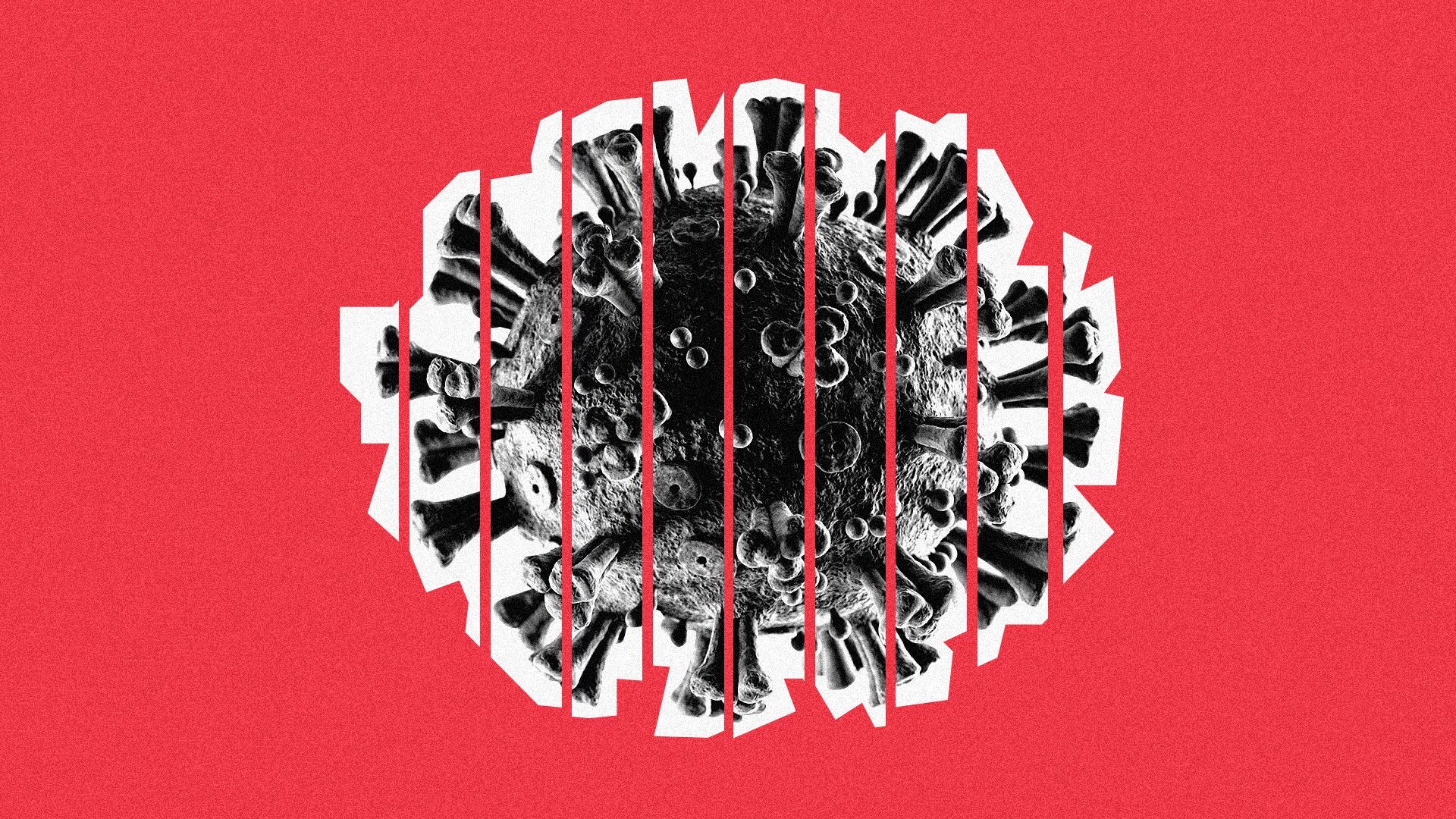| |
| |
| |
| Presented By Coalition for Affordable Prescription Drugs |
| |
| Vitals |
| By Caitlin Owens ·Apr 27, 2021 |
| Good morning. Today's word count is 984, or a 4-minute read. |
| |
| |
| 1 big thing: Politics sways seniors' vaccine enthusiasm |
 Data: Axios/Ipsos Poll; Chart: Michelle McGhee/Axios Seniors are more enthusiastic about the coronavirus vaccines than younger Americans, but even that high-risk population is still subject to some partisan divides, according to Axios-Ipsos polling over the last several months. The big picture: In the most recent waves of our Axios-Ipsos survey, 85% of seniors said they had already been vaccinated, or were likely to get vaccinated. - Real-world results bear that out: 82% of U.S. seniors have received at least one dose of the vaccine, per the CDC.
Yes, but: Even though a large majority of seniors have embraced the vaccine, partisanship is still the biggest dividing line — mirroring the trends in the population as a whole. - 95% of Democrats over the past month said they have gotten vaccinated or are likely to — compared to 84% of independents and 78% of Republicans.
- 17% of Republican seniors said they have gotten back to their pre-pandemic lives, compared to just 3% of Democrats and 9% of independents.
- There's no racial divide in seniors' vaccine enthusiasm, at least between white and non-white seniors. Higher-income seniors are more enthusiastic than their lower-income peers, but enthusiasm has increased across all income levels.
Between the lines: The partisan divide has basically flipped since last fall. When Donald Trump was still president, and some critics feared he would rush a vaccine through the approval process, only 42% of Democratic seniors said they were likely to get vaccinated, compared to 53% of Republican seniors. What's next: 15% of seniors said they're not likely to get a shot — leaving them at serious risk, no matter their politics. |
    |
| |
| |
| 2. Drug pricing legislation hits a wall |
| The White House is unlikely to include a major effort to lower prescription drug prices in its upcoming legislative package, the Washington Post and the Wall Street Journal reported yesterday. Why it matters: Such a measure would allow Medicare to negotiate the price of drugs and is expected to lower U.S. drug spending by billions of dollars — which has been a top Democratic priority for years. - Congressional leaders have been pushing for the Biden administration to include the measure, which is fiercely opposed by the drug industry, in its upcoming spending and tax package.
- "Disagreements among Democrats about how to use the savings generated by drug-price negotiation has complicated its path forward," per WSJ.
What we're watching: The proposal is expected to extend the enhanced Affordable Care Act subsidies that Congress temporarily strengthened earlier this year, per the Post. - And nothing is set in stone on drug prices.
|
    |
| |
| |
| 3. Europe to set a vaccine passport standard |
 |
|
| Illustration: Annelise Capossela/Axios |
| |
| Europe seems poised to set the global standard for vaccine passports, now that European Commission President Ursula von der Leyen has signaled that vaccinated Americans will be allowed to travel to the continent this summer. Why it matters: Opening up travel to vaccinated Americans will bring new urgency to creating some kind of trusted means for people to prove they've been vaccinated, Axios' Felix Salmon reports. The big picture: There will probably never be a single credential that most people use to prove they've been vaccinated, for every purpose. - But the EU's system will help set a standard for a proof of vaccination that's both easily accessible and difficult to forge.
- The U.S. is being closely consulted on the European passport, so any future American system will likely use similar protocols.
Details: Informal mechanisms like simply asking someone whether they're had a shot can suffice in many situations. A system for international travel will likely be far more stringent. And there's a wide middle, too. - Other activities that don't need the same rigorous standards as international travel could rely on the CDC's vaccination cards; options like a printed QR code, similar to what's been proposed by PathCheck; or a digital QR code, like the ones created by CommonPass or the Vaccine Credential Initiative.
The bottom line: The world of vaccine passports is almost certainly going to end up as a mishmash of different credentials for different activities, rather than a single credential used by everybody for everything. |
    |
| |
| |
| A message from Coalition for Affordable Prescription Drugs |
| Protect seniors: eliminate the Rebate Rule for good |
| |
 |
| |
| The Biden Administration has delayed the Rebate Rule, temporarily protecting seniors from premium increases of up to 25%. Eliminating the rule will: - Maintain historically low Part D premiums.
- Create $170 billion in savings for urgent priorities.
- Protect seniors' high-quality coverage.
|
| |
| |
| 4. Employer interest in mental health spikes |
| Employers are taking a harder look at mental health benefits and employee resource groups as they design their post-COVID benefits packages, according to a new survey by Willis Towers Watson. Details: 51% of employers said mental health is among their top three benefit priorities; and 33% said the same for employee resource groups, Axios' Tina Reed writes. - Just 27% of employers put mental health in their top three priorities in 2019.
What they're saying: Most companies saw some pretty significant jumps throughout the pandemic in their mental health claims, said Rachael McCann, senior director of health and benefits and NA Diversity, Equity & Inclusion Leader at WTW. Employers also say they want to address social determinants of health in their benefits packages, though they're not sure what, exactly, to do, McCann said. - "There's just such a delay between 'Yes, I know it's important,' to 'I know what to do,'" she said.
|
    |
| |
| |
| 5. Insurers reinstate charges for COVID treatment |
| Several big health insurers have quietly begun charging patients for their COVID-19 treatment, Kaiser Health News reports. Why it matters: Insurers waived most cost-sharing for coronavirus treatments last year, but those waivers are now expiring, Axios' Marisa Fernandez writes. And the costs for people who end up in the hospital "could be substantial," per KHN. The state of play: Anthem and Aetna have ended their cost-sharing waivers. UnitedHealth began rolling back in the fall and finished doing so by March, KHN writes. - Some smaller plans will continue to waive patients' costs into this summer.
- COVID-19 vaccinations and testing should still be free, based on guidance from the White House.
|
    |
| |
| |
| 6. Catch up quick |
 |
|
| Illustration: Aïda Amer/Axios |
| |
| The Biden administration took its biggest step yet toward becoming a global supplier of coronavirus vaccines, announcing that it would export 60 million AstraZeneca doses over the next several weeks, Axios' Dave Lawler reports. The world has now crossed 1 billion total vaccines administered, Dave writes. Nearly half of those have come in the U.S. (29%), EU (13%) and U.K. (5%), with other rich countries also sprinting ahead. About three in four unvaccinated adult Americans are unwilling to get the Johnson & Johnson coronavirus vaccine, a Washington Post-ABC News poll out Monday indicates. West Virginia will begin offering $100 savings bonds to people aged 16 to 35 who get vaccinated, Gov. Jim Justice (R) announced on Monday. Months after reporting dangerously high COVID-19 infection levels, the Navajo Nation now says it has vaccinated more than half of its adults for the disease, outpacing the rest of the U.S. The European Commission has launched legal proceedings against AstraZeneca for providing only a third of the supply of coronavirus vaccines agreed to in its contract, a spokesperson confirmed Monday. |
    |
| |
| |
| A message from Coalition for Affordable Prescription Drugs |
| Why eliminating the Rebate Rule is crucial to protect seniors |
| |
 |
| |
| The Trump Administration's prescription drug Rebate Rule will: - Raise seniors' premiums by up to 25%.
- Skyrocket government spending.
- Fail to deliver the lower drug costs that patients need.
Learn how eliminating the rule will protect seniors and save money. |
| |







No comments:
Post a Comment